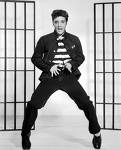As most of my readers will know, Kevin Carson uses the term “vulgar libertarian” for the all-too-prevalent tendency in this movement of ours to treat the prevailing state capitalist order as an approximation to a free market, thus allowing the case for the latter to serve as a justification for various features of the former – an unfortunate legacy, IMHO, of the quondam alliance of libertarians and conservatives against state socialism. (Incidentally, as Carson has noted, the term is best used for the sin and not for the sinner, since very few of us commit it consistently.)
I fear I must chide my seldom-vulgarlibbin’ comrade Butler Shaffer (who after all wrote the very un-vulgarlib In Restraint of Trade: The Business Campaign Against Competition) for going the vulgarlib fallacy one better in an LRC blogpost today that treats prison camps as an approximation to the free market.
 Butler uses the fact that trade in prison camps leads to significant inequalities of wealth as evidence that free markets generate such inequalities – and so as evidence that such inequalities are unobjectionable from a libertarian standpoint.
Butler uses the fact that trade in prison camps leads to significant inequalities of wealth as evidence that free markets generate such inequalities – and so as evidence that such inequalities are unobjectionable from a libertarian standpoint.
Now I have no idea what the extent of economic inequality would be in a free market. Certainly most of the current inequalities, depending as they do on direct or indirect governmental intervention, would be absent; but I don’t claim to know that entrepreneurial skill and/or luck wouldn’t lead to new ones.
What I do claim is that a prison camp, in which all goods are doled out in fixed quantities by the guards and no one has independent access to natural resources, is an even poorer model of a free market than state capitalism is; making inferences from the prison camp to the free market is accordingly risky. Even if in such a prison camp higher economic positions are initially achieved by free exchange, they are in part maintained by the fact that nobody can compete with the present winners by going off and producing more cigarettes or whatever. A prison camp is a perfect example of a world in which production and distribution are radically separated; how goods end up being traded has no effect on the kinds or quantities of goods that will be produced in the future.
Suppose that through clever trading I’ve managed to accumulate more gumdrops than any other prisoner, and am consequently charging high prices for this scarce commodity. In a free market, this would send a price signal to encourage increased production of gumdrops, and my market share would quickly be in danger of erosion. But in the prison camp the production and (initial) distribution of gumdrops is entirely outside of the prisoners’ control, and so the forces that produce competition are suppressed.
In a free market, by contrast, the forces that produce economic inequality by rewarding entrepreneurial judgment face constant challenge from other forces that work to undo such inequality by rewarding the entrepreneurial judgment of competitors. These forces are severely hampered in a prison camp; inequalities in the latter thus tell us little about what inequalities to expect in the former.
The state capitalism that prevails in western democracies is freer than a prison camp; but, as Kevin frequently notes, access to natural resources is artificially restricted here too. (I don’t agree with all the details of Kevin’s views on land – see our exchange here – but I certainly agree with that general point.) And as Kevin further notes, much existing inequality draws support from those governmental restrictions. Thus inequality under state capitalism is likewise an unreliable predictor of how things will be under liberty.
More American families will have to bear the unbearable and rationalize the unforgivable – “sacrifice” – sacrifice now, sacrifice tomorrow, sacrifice forever. …